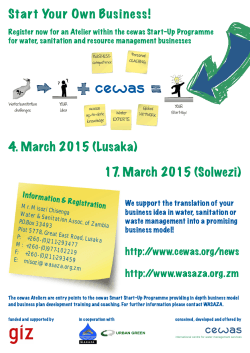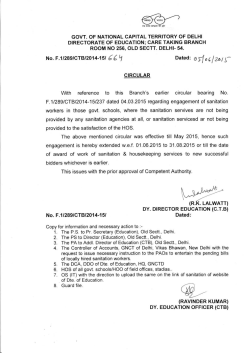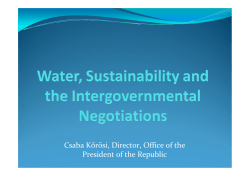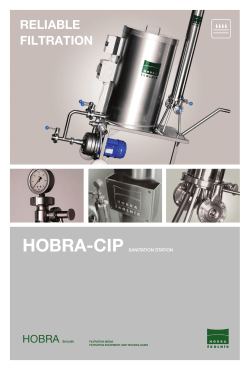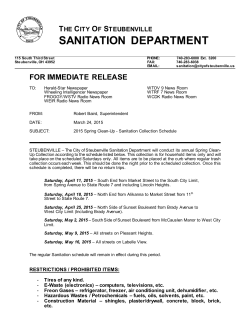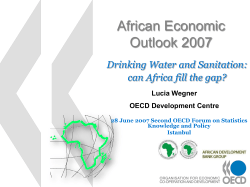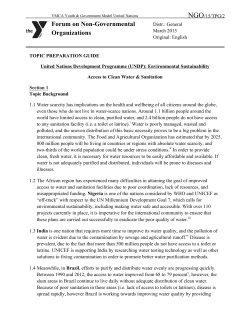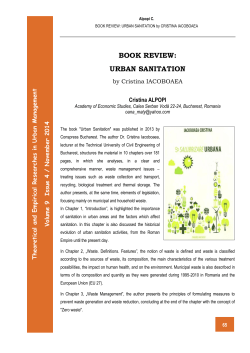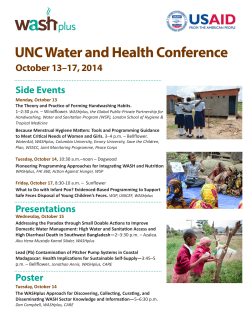
Building a Partnership with Local Bodies and Local
Building a Partnership with Local Bodies and Local PeopleRural Development Organisation Nilgiris district is distinct in terms of its geographical characteristics. The district has waterfalls, rivers and streams which attract tourists from all over the world. Because of tourism, the economy is accelerating and people’s earning capacity has increased but on the flip side it is creating pressure on the environment which is getting polluted. Thus there arose a need for local institutions and elected representatives of the people to address problems arising due to poor sanitation and waste management. Rural Development Organisation (RDO Trust) is a non government organization which is based in Nilgiris, Tamilnadu. The Trust has made the best use of local resources and has involved the Government bodies in best possible ways to maintain the sanitation standards of Nilgiris District. Many of the initiatives are aimed at making the hill district free from open defecation. Background RDO Trust was formed in 1980 and primarily focused on the issues of child rights, women empowerment and issues around local tribals and Dalits who have minimal resources. RDO Trust also advocates and works with the local government to ensure housing, education, sustainable livelihoods, water and sanitation which are among the essential necessities to lead a life of dignity. RDO Trust has formed SHGs in every village in which it operates. SHGs are the hub where, apart from regular saving and credit activities, they also act as centres for the women to exchange information and for discussing the initiatives and actions which can make their living conditions better. Most of the meetings are conducted with the help of Panchayat Ward members. Role of SHGs In Thendrelnagar village, five SHGs were formed in 2008. Most of the group members are daily wage earners. In one of the groups, named, Saraswati, women have taken a loan of Rs.500,000(about € 6,500) from the Ranganathan Primary Agriculture Cooperative Bank for two purposes: Each group member took a loan of Rs. 20,000 to build a household sanitation system The women utilized the remaining amount for taking tea cultivation land on lease. All members collectively cultivate tea by sharing responsibilities. When the leaves get ready for plucking, each member puts in free labour twice a month which reduces the overhead costs. The group sells about 600 kg. of green tea leaves in a month. The income from the sale of tea leaves depends on the rate fixed by factories every month. The earning is equally distributed amongst the members. Socio economic background of operational area Nilgiris is one of the districts of Tamil Nadu and is located in the Western Ghats. The district has six taluks1, which are located at the altitude ranging from 1,000 to 2,150 meters (3000 feet to 6500 feet). The district has a population of 7,35,071 (according to census 2011) and is characterised by a high proportion of the socially excluded- almost 35 percent (31.23 percent SC and 3.72 percent ST). The State has given a new thrust on the sanitation front for declaring Tamil Nadu as an ‘Open Defecation Free State’, by strengthening institutional arrangements for implementation, ensuring availability of funds, provision of infrastructure and also through sustained IEC campaigns. However, the toilets which were constructed became dysfunctional due to various reasons such as inappropriate selection of toilet models, lack of superstructure, water scarcity, lack of technical support. Salient features of the programme RDO Trust has set a target to construct 100,000 toilets, to transform the district into ‘Open Defecation Free’ district. This is a big target and the most important and essential part is to ensure community participation and people’s involvement to achieve the target of creating sanitation assets at their household level. However, the community in the rural areas needs some basic support and assistance. RDO Trust provides the following support: a. Financial assistance to the needy families through SHG-bank linkage The first challenge for the organization was to arrange finance for the target community, which comprises mostly Scheduled Tribes (STs) and Scheduled Castes (SCs). Because of the topography, costs of construction of toilets here are higher than on the plains. On an average, per unit cost of a toilet is around Rs. 25,000. The organisation has joined hands with NABARD, ICICI Bank, Canara Bank and Bank of India. Financial assistance is provided to the women’s group members through bank linkages so that they can initiate economic activities and at the same time create household assets. 1 Taluks: Subdivision of District, organized for revenue purpose b. Active involvement of representatives of Panchayat Raj Institutions Panchayat Raj Institutions2 have mandates to plan and implement programmes for social and infrastructure development. RDO Trust has created a data base by collecting information on Panchayat Presidents, Ward Members3 and Town Panchayat Members. At the village and Panchayat level, the organization works in close coordination with the Panchayat Presidents and Ward members who play a significant role in motivating community members in their respective Panchayats and Wards. The Panchayat Presidents regularly participate in the village level and public meetings. The house to house visits and meetings with the SHG members are organized by the Ward Members. This has made it possible for the RDO Trust to reach a large number of people which has resulted in many community members getting involved in the sanitation programme. c. Involvement of other stakeholders A district level Sanitation Task Force has been formed which is represented by the members from educational institutions, Lead Bank4, Indian Red Cross Society, Panchayat Raj Institutions and others. A Programme Monitoring and Review Committee comprising of the Assistant General Manager, NABARD; representatives from RDO and 25 SHG members has been formed. d. IEC activities and capacity building training programmes RDO has developed simple and easy to understand printed materials and stickers, which are circulated among the community members. Films on sanitation and solid waste management are also shown every month. So far, 92 film shows have been organised covering 3059 people. The SHG and Panchayat Ward members are given technical inputs and community participation skills so that they become capable of extending assistance to the fellow members. A Sanitation Park has been established at the premises of the RDO Trust. Training programmes are organized at the Sanitation Park for the villagers and outsiders. e. Appropriate design and model for meeting the requirements of landless and poor families Lack of land holdings among the poor families was one of the greatest obstacles faced by the RDO trust. Because of intensive awareness generation programmes, the community realized the need for toilets, but many of them did not own land on which 2 Panchayat Raj system is a three-tier system in the state with elected bodies at the Village, Taluk and District levels. It ensures greater participation of people and more effective implementation of rural development programmes. 3 Ward members are elected from the villages. They are independent candidates. Approx. 500 households elect one Ward Member. 4 It refers to a scheme under which one of the commercial banks acts as a lead bank and coordinates the activities of other financial institutions like cooperative banks for efficient functioning and rapid development at district level they could build toilets. In the operational areas of RDO Trust, one can find innumerable settlements where houses are built on the land provided by the State Government. The houses are built in rows in sequence and the space provided to the families is just enough to build a small house. In the settlements of this nature, the organization motivated the community to construct household toilets in the vacant place available in front of the houses. The Nilgiri biosphere is undergoing many human induced impacts on the ecosystem because of degradation of forests and relentless use of land for commercial and agricultural purposes. The RDO trust has introduced a cost effective and eco-friendly sanitation system which is known as pre-fabricated toilet. In this model, materials like, cement/sand/bricks are not needed and only galvanized sheets are used. (Base material for galvanized sheet is iron. The galvanized sheets are coated with zinc to make it rust free). The structure can easily be carried to the locations. It requires less amount of water5 and is odour resistant. Prefabricated toilets are suitable in the hilly areas as a common septic tank can be set up in labour quarters, schools, tourist places and also in villages. The portable toilet costs Rs.16,700. WASTE and FINISH support to RDO Trust: RDO Trust is supported by FINISH for its Sanitation Project. Its operation areas are spread across 35 village Panchayats. RDO trust has been addressing very crucial issues like education, health, livelihoods etc. which have a direct impact on the community. The sanitation project supported by FINISH provided the organization an opportunity to focus on the vital issue of sanitation. RDO Trust now has the potential to involve stakeholders from varied sectors. I. The organization is visited by the FINISH representatives regularly. FINISH has organized training programmes for the village animators on behavioural and technical aspects of the issue of sanitation. Since SHGs are the core units, the animators have also been trained on group formation, leadership building, book keeping, SHG-Bank linkage and so on. FINISH has also supported RDO in organizing trainings for the local masons. 70 masons have undergone training. The construction of the toilets is done by these trained masons. II. 5 FINISH has supported RDO Trust to print and distribute IEC materials. Brochures, posters, hand bills, mural paintings, wall paintings, stickers etc. have been developed to sensitize the rural communities on health and sanitation. Small booklets, brochures, TV scrolling etc. target a wider audience which includes tourists, corporates, people’s representatives, government functionaries, school children etc. The pans used are sloppy type connected with "S" trap. The pan with a bigger hole and "S "trap system helps to flush with just one litre of water. III. WASTE assistance was provided to the organization to work intensively with the Panchayat representatives. One-day workshops were organized in 4 different taluks with the representatives to apprise them of the present condition of sanitation and the need to take appropriate action. RDO involved 35 Gram Panchayat Presidents, 13 Town Panchayat Presidents and 850 Ward Members in the sanitation programme. The Panchayat level meetings are presided by the Panchayat Presidents and home visits along with awareness generation activities are supported by the Ward Members. IV. It was a challenge for the RDO Trust to leverage financial support from the banks as they asked for financial guarantee before sanction of loan to the SHG groups for household toilet construction. RDO, with the prior approval of WASTE/FINISH deposited Rs. 50,00,000 (EURO 89,360) at Union Bank of India, Eelada Branch. The Bank Manager extended a loan of Rs.86,00000 to construct 430 household toilets. Similarly, a deposit has been made with Bank of India which has extended a loan to construct 9,000 household sanitation systems. Conclusion RDO Trust has taken a novel initiative to make Nilgiri District free from open defecation. The organization has been successful in involving local communities and other stakeholders, which includes banks, schools, corporate bodies, Panchayat institutions and so on. At present there are four nationalized banks on board and more than 900 Panchayat Representatives to support the programme. It is also taking media support to raise awareness on the issue so that common people can understand the need of maintaining sanitation standards for the sake of protecting the ecology. At the micro level, RDO Trust has provided all the required support to the community to construct sanitation systems in a cost effective manner. The contractors are kept away. In most cases, the SHG members collectively purchase the construction materials. The construction of the systems is done with the help of masons trained by FINISH. Most of the sanitation systems in the project villages are in good condition. Many families have made fair amount of investment on toilets by fixing tiles and good quality slabs so that the hygiene can be well maintained. Looking at the standard of the maintenance and investment, it is quite evident that community understands the benefits of having safe sanitation facilities. Manjula and family set an example Manjula is a member of Kavitha Sakti JLG at Atchuthampettai village. There are 116 houses in the village which is 5Km. from the main town of Nanilam. There are RCC houses but none of them have toilets. Everyone uses the roadside for open defecation. Manjula and her husband Paneerselvam have been living in the same village for the past 36 years. The average income of the family is Rs. 30000. They have 2 children. The elder one is a daughter Priyanga who is 20 years old and she is pursuing her BA degree. The younger one is a son Manimurugan who is 18 years old and is doing his DCE. They have all been using the backyard of their house which is covered by bushes for open defecation for the past 36 years. The neighbouring houses are high rise buildings. BWDC and FINISH came to the village and gave an orientation on safe sanitation systems and methods of receiving financial support. Manjula and her husband attended the orientation and took a firm resolve to construct a household toilet by availing of micro finance. They also began to motivate their neighbours. Finally, 5 families came together and approached the BWDC. All 5 families received loans of Rs. 12000/- each. The families jointly procured the materials needed and organized mason, labour etc. Due to their group effort, the constructions were done well and in a cost effective manner. Manjula and her family are using the toilet regularly. Other families have also come forward to avail of loans and construct toilets- thanks to BWDC and FINISH.
© Copyright 2025
